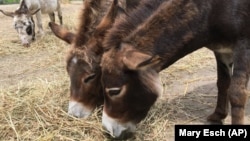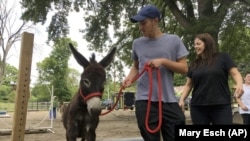In many places around the world, donkeys are used for carrying heavy loads.
But at Donkey Park, the animals’ only job is to offer comfort to visitors.
Donkey Park is the creation of Steve Stiert. The former software engineer had spent more than 25 years working in front of a computer. Six years ago, his job at IBM ended. At 59 years old, Stiert decided he wanted a change.
He learned about donkey behavior from his daughter, who was studying to be a veterinarian. He quickly fell in love with the animal’s calming nature.
Now, Stiert is giving people the chance to spend time with donkeys.
He says he feels a close connection with these animals. He believes donkeys changed his life.
“They brought out this caring, sensitive person I had pushed to the background while trying to be successful.”
Stiert has 11 donkeys. He also has a mule and a donkey-zebra mix, called a "zonkey." All of the animals live on the grounds next to his home in Ulster Park, New York. The area is 130 kilometers north of New York City.
Stiert takes his animals to schools and homes for old people, as well as to events for children with disabilities. He also teaches donkey farming and has an 800-member Meetup group. The members go on group walks with the donkeys.
“A lot of people come up from the city, travel long distances,” Stiert says. “When they come out here, you can just see the stress melting away from them.”
Donkeys are becoming more and more popular for animal-aided therapy.
Donkey Sanctuary is based in Devon, England. The organization offers donkey-aided therapy for children healing from cancer, victims of human trafficking and others.
Caron Whaley is the therapy director at Donkey Sanctuary. “We’re not providing therapy for the trauma but for developing life skills,” Whaley said.
Donkeys are often shown as foolish or unfriendly in popular culture. But donkey supporters say the animals are actually calm, intelligent and affectionate.
Stiert says some people come to Donkey Park thinking the animals will bite them or behave badly.
“None of those things are true at all,” he said.
The Arc of Ulster-Greene is an organization that serves people with intellectual disabilities. Each week, it takes a group of adults to Donkey Park. There, they brush the animals, walk them around and feed them. The donkeys are very social. Many of them quickly walk toward visitors and stay to have their long ears rubbed.
Tom Cossaboom sometimes goes on these outings with Arc. He says the animals make him feel at ease. “They’re friendly and calm.”
Stiert bought his first six donkeys from breeders. He later decided to start taking in rescue donkeys. His Donkey Park is registered as a nonprofit organization, but he mostly uses his own money to care for the animals. He does not do birthday parties, religious events or other events to raise money.
“All our services are free,” Stiert said.
Patti Lundgren says she looked for Meetup groups when she moved to the area and became interested in the donkey walks. Now, she often drives 45 minutes to volunteer at Donkey Park.
“There’s such a gentle energy about them,” Lundgren says. “I always leave here feeling really good. The dirtier I am, the better I feel. Ah…donkey love.”
I’m Alice Bryant.
Mary Esch wrote this story for the Associated Press. Alice Bryant adapted it for Learning English. Ashley Thompson was the editor.
_____________________________________________________________
Words in This Story
veterinary – adj. relating to the medical care and treatment of animals
mule – n. an animal that has a horse and a donkey as parents
zebra – n. n African animal that looks like a horse and has black and white stripes covering its body
trauma – n. a very unpleasant experience that causes someone to have mental or emotional problems usually for a long time
brush – v. to clean or smooth something (such as hair) with a brush
breeder – n. a person who keeps and takes care of animals in order to produce more animals of a particular kind
stress – n. a state of mental tension and worry caused by problems in your life, work or other things
background – n. a position that attracts little attention







